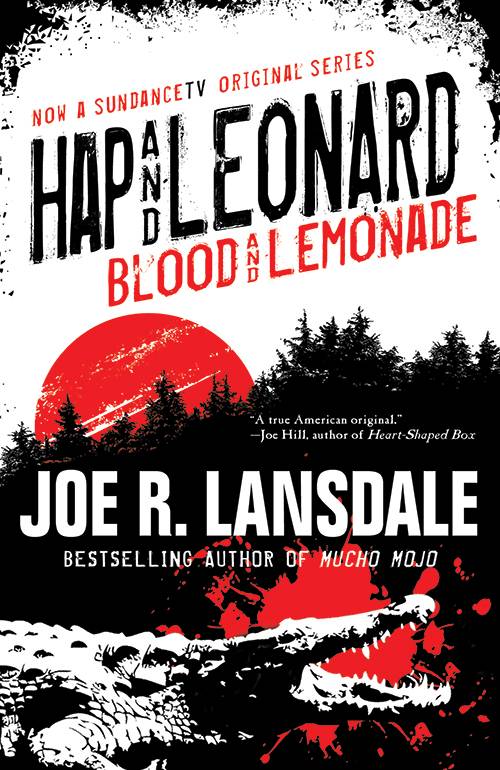Texas Trouble

Hap and Leonard: Blood and Lemonade
By Joe R. Lansdale
San Francisco: Tachyon Publications, 2017.
240pp. $15.96 paper.
Reviewed by
William Jensen
If Frank Dobie is the Lone Star State’s Homer, if Larry McMurtry is the Texas equivalent of Henry James, then Joe R. Lansdale has to be the Mark Twain behind the pine curtain. No other writer—in Texas or any other state in the union—can switch between gut-bursting humor and nail-biting suspense with as much heart and grace as Lansdale. His newest book is billed as a companion piece to the television show Hap and Leonard, which is based on the author’s bestselling series of novels involving (white, liberal, and straight) Hap and (black, conservative, and gay) Leonard. Of course one does not need to have seen the show or even have read the previous thrillers to enjoy this fantastic book. Rather than a singular narrative, Blood and Lemonade is more a collection of short stories about Hap’s youth and his first run-ins and adventures with Leonard. Though crime and criminals appear throughout, the stories are more about growing up—specifically growing up in the ’50s and ’60s in East Texas during segregation and the civil rights movement. The tales are linked via memory of the characters, but each story is able to stand on its own as a flash of passing innocence or as a lesson in well-intentioned cynicism.
For fans of Savage Season and Mucho Mojo, the story “In the River of the Dead” will surely satisfy. This is like a highly condensed Hap and Leonard novel in itself. The boys stumble across a murdered family in a sunken boat in the Sabine River and are forced by the family's killers to retrieve some hidden treasure. Luckily, Hap and Leonard are smarter and tougher than the average cowboy, and they navigate the thrilling story with a great amount wit. There is sharp dialogue and memorable bad guys—all trademarks of Lansdale.
Most of the stories in Blood and Lemonade however don’t involve robbery or homicide, but focus on issues of race and young Hap’s beginning to comprehend how divided his world is between whites and blacks. The book’s title story explores this theme without flinching. After going to the movies, Hap and his mother try to help a black boy named Nathan. Ultimately, their good deeds are not exactly rewarded. I won’t spoil the ending, but the piece ends with an anecdotal fable, and this is similar to the rest of the collection. Most of the stories are similar to this one where there is a distinct lesson gained by young Hap. In fact the first story even has the title of “The Parable of the Stick”—about a chance encounter where Hap learns the value of force. All of these pieces include Lansdale’s easy-going voice and his unflinching honesty.
My favorite story in Blood and Lemonade however is more of a sketch. Titled “Down by the Riverside,” it is only six pages but is as haunting as some of Isaac Babel’s war fiction. Hap is returning from fishing at the river when he notices two men standing outside a car with a crying woman inside it. Hap knows something is wrong, but he’s not in any position to help. He keeps moving and reflects on the situation, and the piece ends on a deft and frightening last line. This story stayed with me because it was just the opposite of the previous mentioned pieces—here there is no lesson learned, there is no epiphany; there is only pain. The fact that Lansdale doesn’t spin a type of moral or a change of character onto the story, makes it somehow more real than a lot of stuff out there.
The main ingredient that makes Blood and Lemonade stand out is that these bits and pieces reflect the racially charged violence that plagued East Texas (and the rest of America) for so long. Recently, there has been such a rise of hate crimes that it is difficult to read these passages without reflecting more on the present instead of the past. But because of recent events, these stories are more important than ever since they serve to remind us of how ugly and brutish things were not that long ago and how quickly we could fall back into such behavior if we allow it.
By combining elements of crime genre with layered characters in a world where race and sexuality are never whitewashed, Blood and Lemonade is a must-have for just about everyone. Joe R. Lansdale is one of the best writers to come out of Texas. Whatever he writes, I’ll read.
William Jensen is the editor of Texas Books in Review and Southwestern American Literature. His short fiction has appeared in North Dakota Quarterly, Stoneboat, The Texas Review, and elsewhere. His novel, Cities of Men, will be published by Turner Publishing at the end of May.
